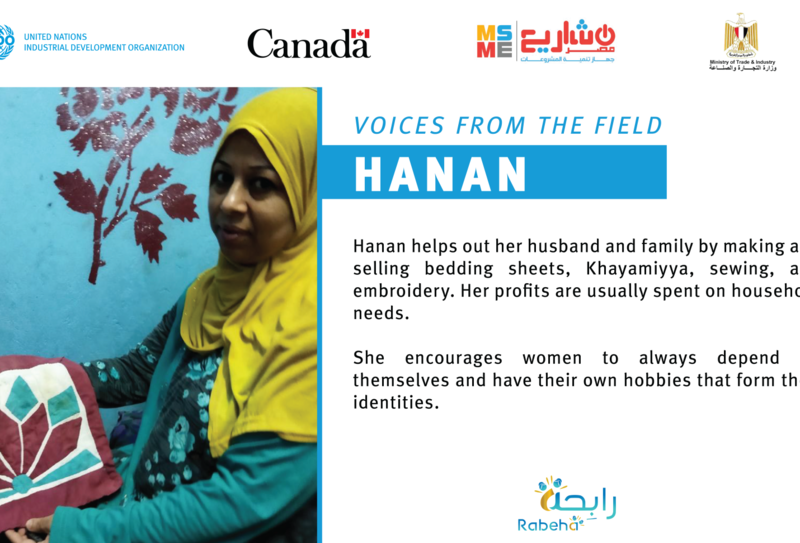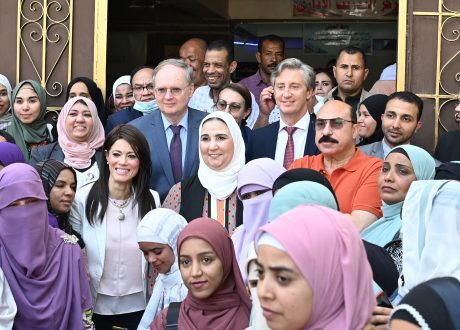
EBRD, EU, GCF allocate $4 m to boost green investments in Jordan
The European Bank for Reconstruction and Development (EBRD), the European Union (EU) and the Green Climate Fund (GCF) decided providing a financing ...

The Rabeha program, run jointly by the United Nations Industrial Development Organization (UNIDO) and UN Women, aims to significantly boost women’s economic empowerment in Egypt by mid-2024.
It is funded by Global Affairs Canada, and is being implemented in partnership with the National Council for Women, the Ministry of Trade and Industry, and the Micro, Small and Medium Enterprises Development Agency.
UNIDO and UN Women are committed to the achievement of the Sustainable Development Goals, and the Rabeha joint program in particular contributes to SDG5: Gender Equality; SDG8: Decent Work and Economic Growth; and SDG10: Reduced Inequalities.
Rabeha is Arabic for “winner”. It is the brand name for a program to provide women in Egypt with the means, knowledge and confidence to realize their unique and valid work-related goals, either as entrepreneurs, early-stage businesswomen or as paid employees.
In line with Egypt’s Sustainable Development Strategy: Egypt Vision 2030, the joint program aims to increase the economic participation of at least 6,300 women in Egypt’s private sector across growth-oriented sectors in seven governorates: Cairo, Giza, Alexandria, Beheira, Fayoum, Beni Suef and Al-Minya.
It will harness these women’s full potential as entrepreneurs and employees in the following target value chains: date palm; medicinal and aromatic plants; handicrafts, and information and communications.
It adopts a multi-sectoral approach and combines activities at policy, institutional and individual levels.
UNIDO has conducted three value chain studies within the framework of the program; for the date palm, medicinal and aromatic plants, and handicrafts sectors.
These studies have informed the development of evidence-based interventions that consider the real needs of women business owners and employees, and the challenges they face in each governorate and sector.
The value chain findings show that handicrafts is the most promising sector for women-led businesses and decent work, with a higher number of female-led businesses and workers engaging in value-added activities compared to the date palm and medicinal and aromatic plants sectors, where women are typically limited to working in the basic stages of the value chain.
UNIDO is planning training interventions to target the needs of women entrepreneurs and employees, which will include product development, innovation, connectivity, branding and marketing and promotion strategies. The approach includes digitizing existing business models through e-marketing and sales, with a view to supporting business continuity during the COVID-19 pandemic and beyond, as well as training in technical skills demanded by the key value chains.
As part of the program, UNIDO and UN Women Egypt provided business development, product branding and legal consultations to women entrepreneurs at the Micro, Small and Medium Enterprises Development Agency’s annual Turathna handicrafts exhibition in October 2021.
The consultations involved a rapid diagnosis of business needs and challenges, followed by the provision of tailored business advice and strategies aimed at improving the productivity and profitability of women-led businesses. UNIDO’s participation in Turathna complements its ongoing work in the handicrafts sector and contributes to achieving its target of providing support to 1,100 aspiring and existing entrepreneurs.
UNIDO will launch training for government officials from five central institutions in Cairo in early 2022. This training of trainers aims to enhance the government support services targeting women entrepreneurs and business owners in Egypt so that they are more gender-responsive and tailored to the real needs of women-led businesses and entrepreneurs, and in general are more accessible to these groups of women in the key sectors of UNIDO’s interventions.
The European Bank for Reconstruction and Development (EBRD), the European Union (EU) and the Green Climate Fund (GCF) decided providing a financing ...
Etisalat Egypt e& – a pioneering company in the field of communications and IT – ...
Egypt’s Ministry of Social Solidarity, the United Nations Development Program (UNDP) and the European Union ...


اترك تعليقا